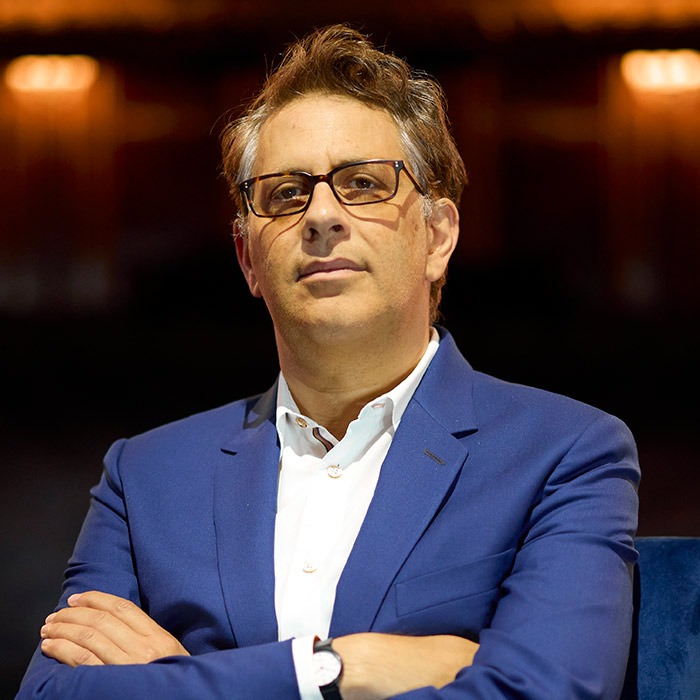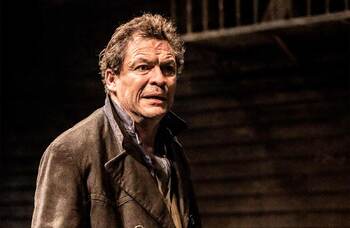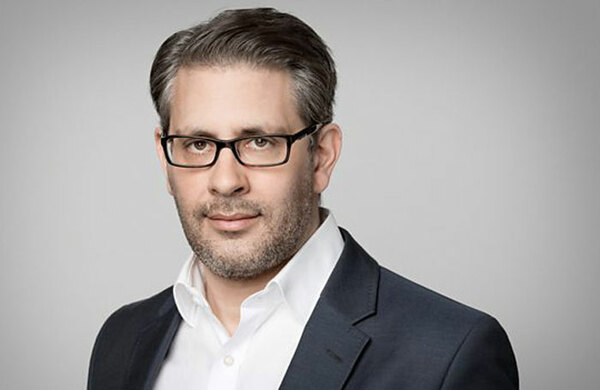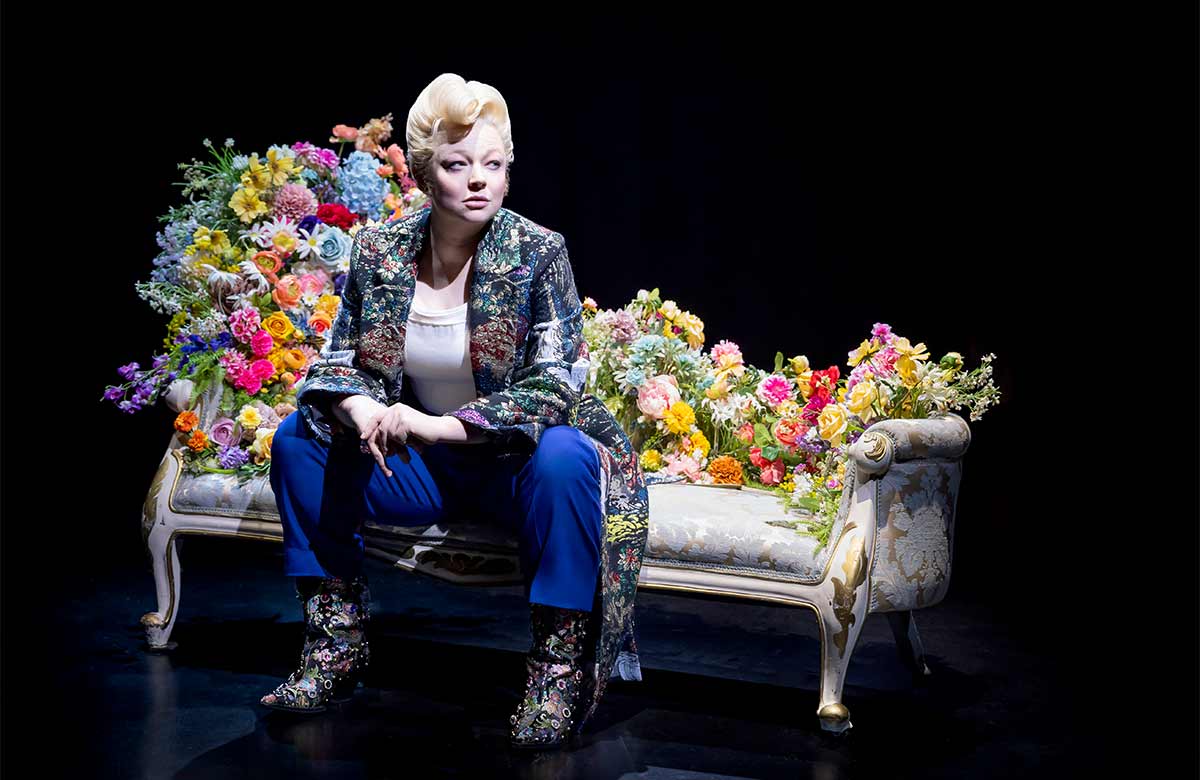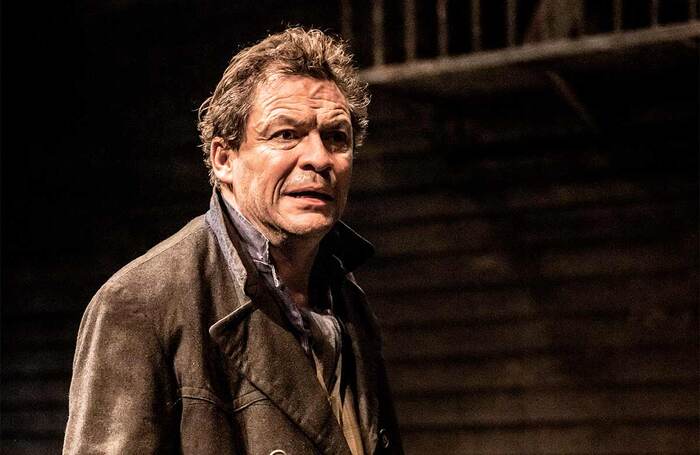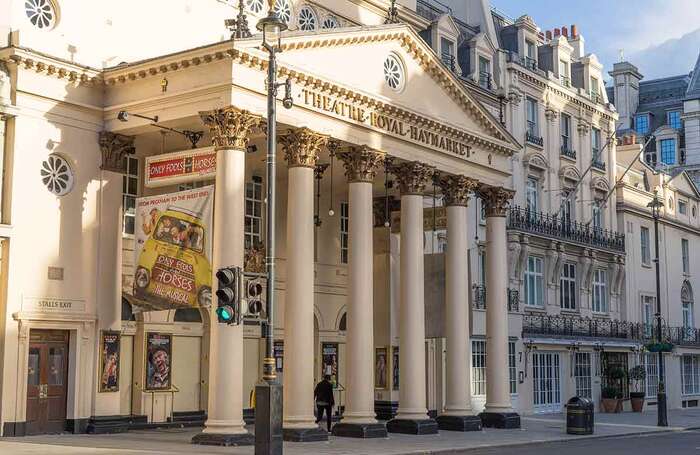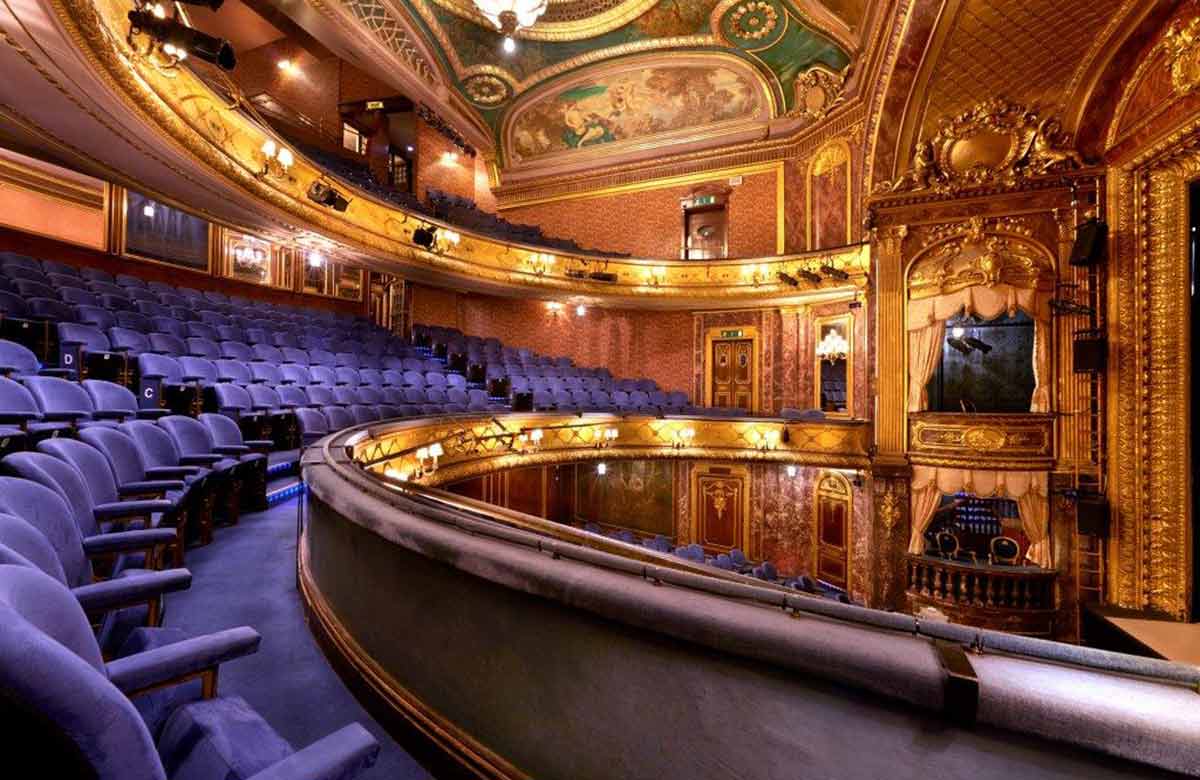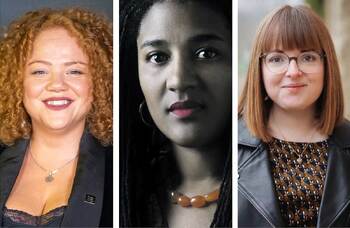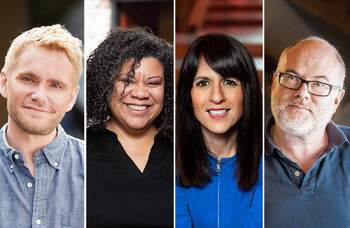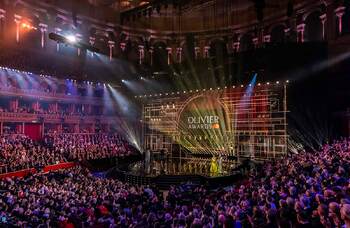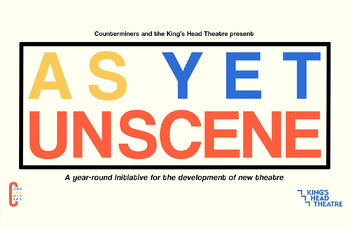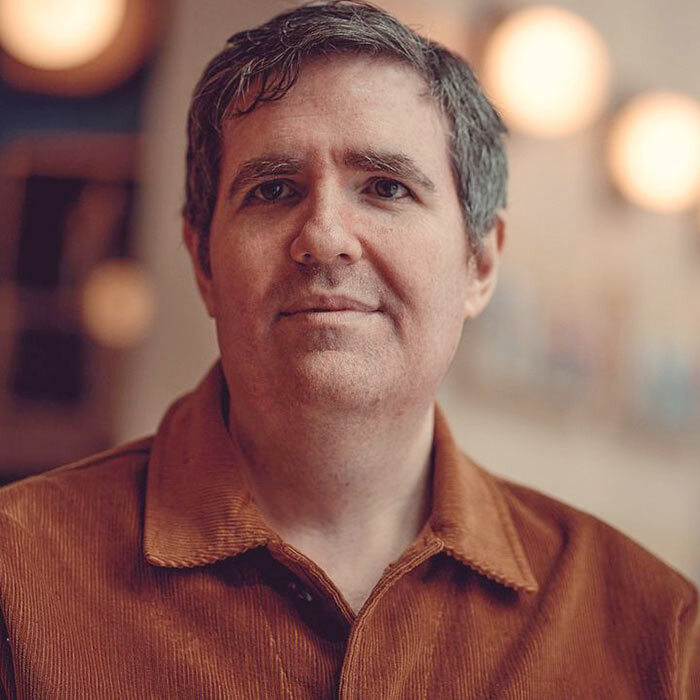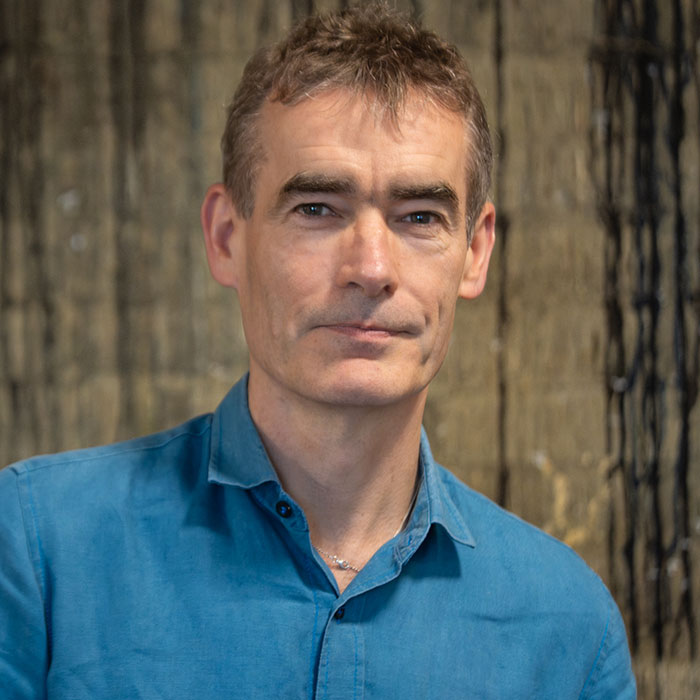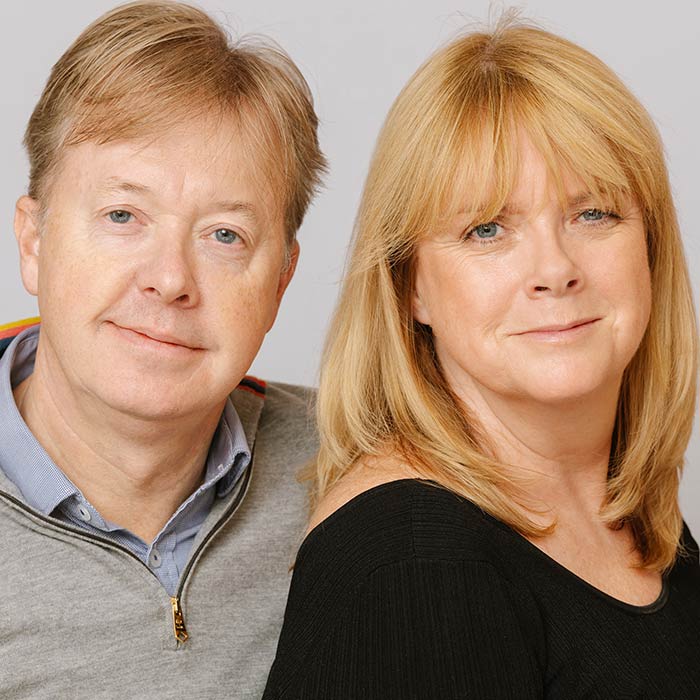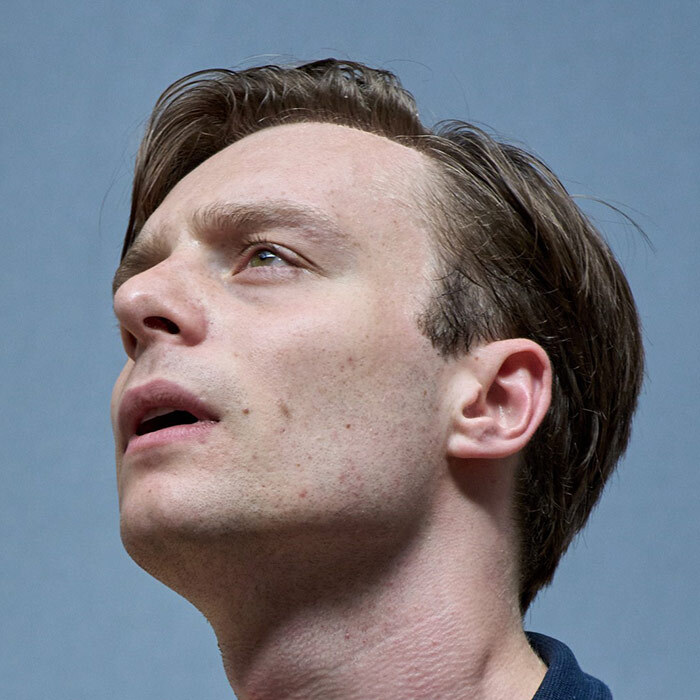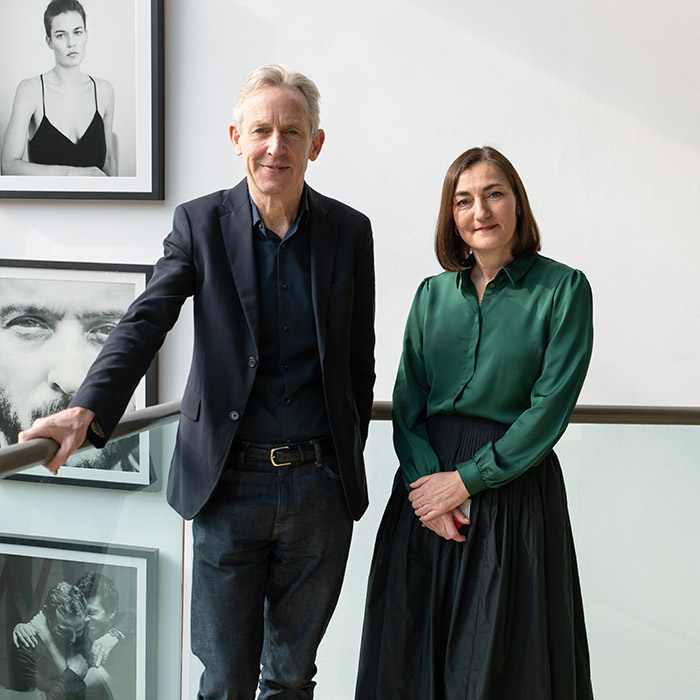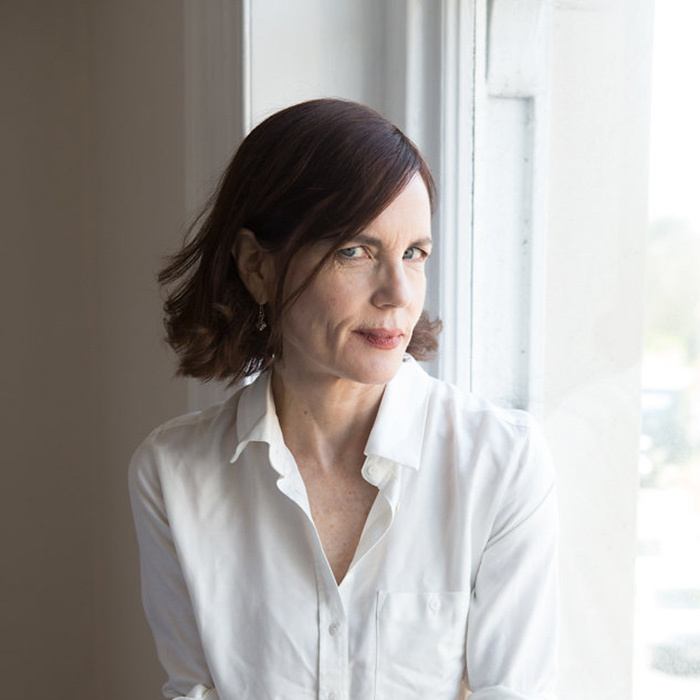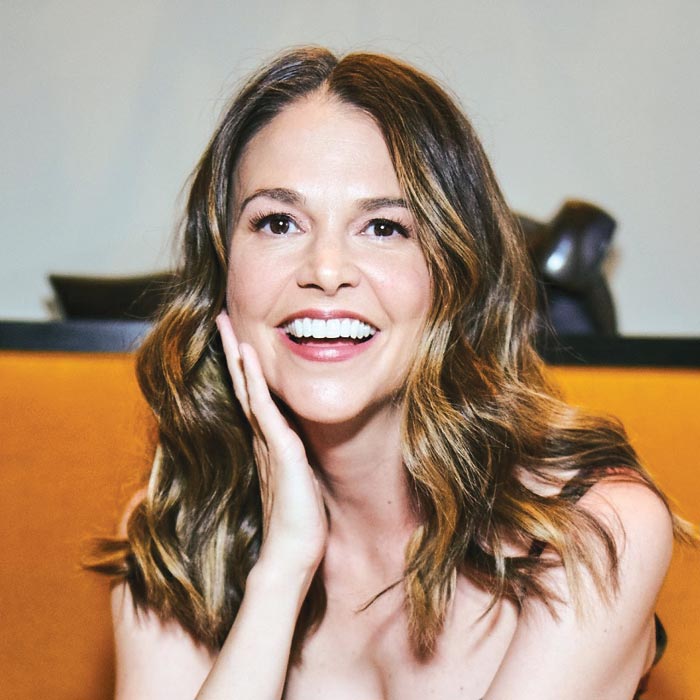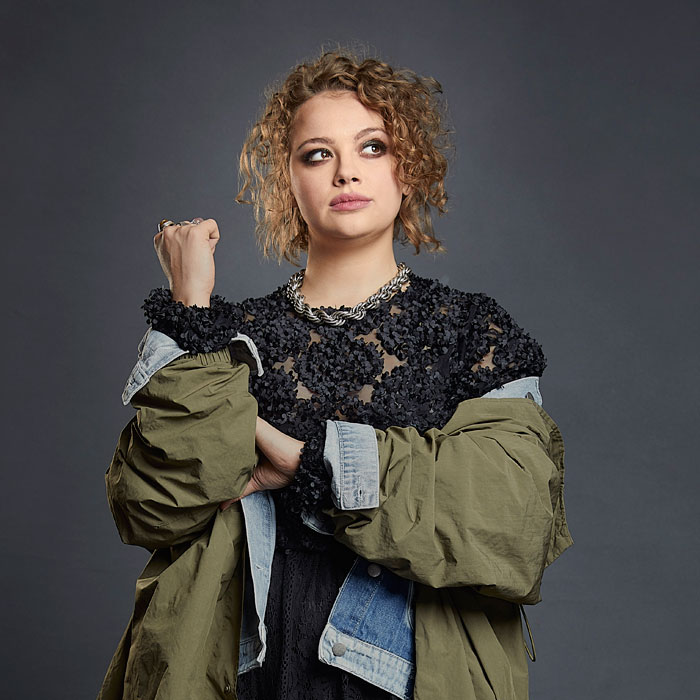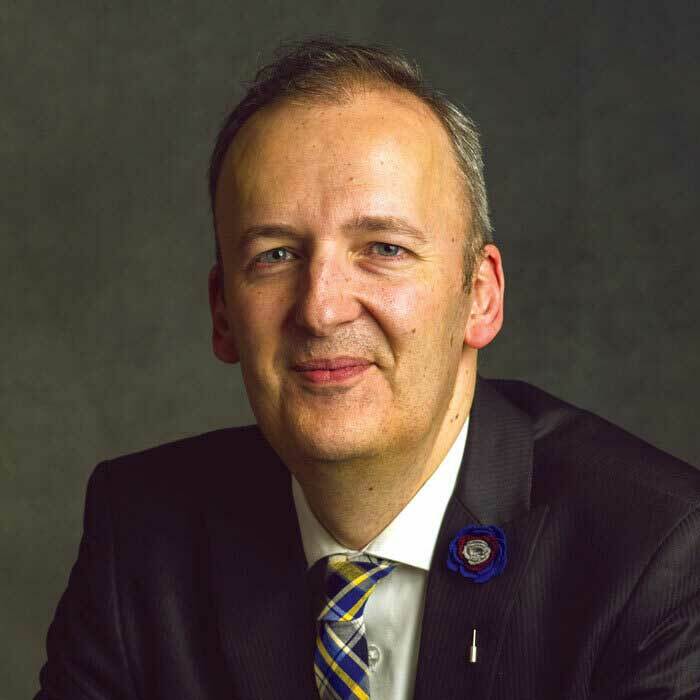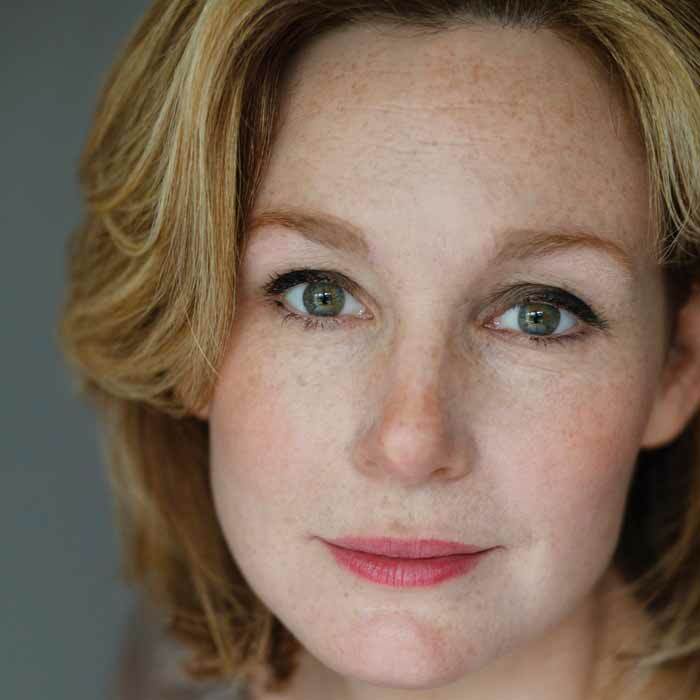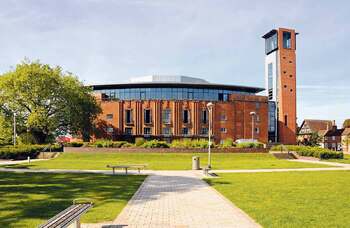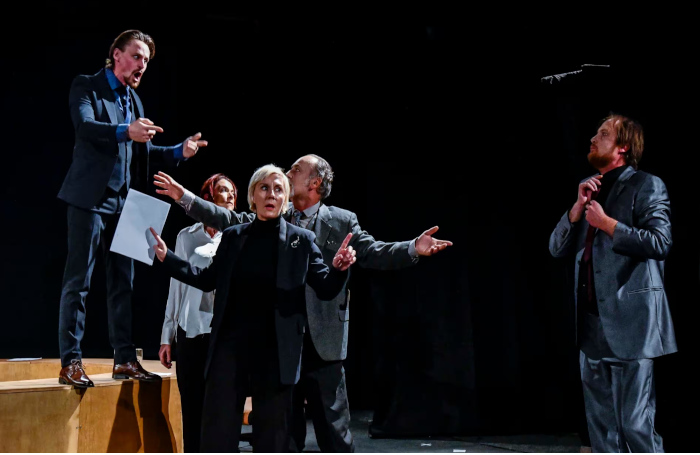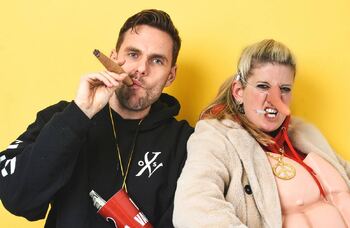Danny Cohen
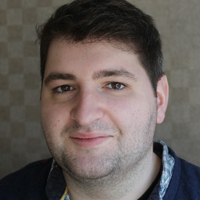 Tim Bano
Tim BanoTim Bano is an award-winning arts journalist who has also written for the Guardian and Time Out, and worked as a producer on BBC Radio 4. ...full bio
The president of Access Entertainment, owner of the Theatre Royal Haymarket, has notched up a string of successes since launching the investment company nearly a decade ago – backing some of theatre’s biggest hits, including Hamilton and Moulin Rouge!. He talks to Tim Bano about his ethos of high quality and audience appeal, ticket prices and making TRH a sought-after premium playhouse
On the walls and leaning against the cabinets of Danny Cohen’s office in central London are posters for some of the most significant cultural products of the past 20 years. There’s Skins and The Inbetweeners, as well as more recent additions such as Hamilton, The Zone of Interest and a note from Tom Hanks scrawled across one for The Moonwalkers. These cultural markers have one thing in common: Cohen himself, who either produced, commissioned or invested in all of them. After 15 years as a TV executive at Channel 4 and the BBC, Cohen is now president and co founder of Access Entertainment, the company owned and funded by Ukrainian-born billionaire Leonard Blavatnik. His job is to decide, when it comes to culture, where Blavatnik’s money should go.
Blavatnik’s name may be a familiar one. You’ll see it above the entrance of Tate Modern’s Blavatnik Building extension, or at the Blavatnik School of Government in Oxford, or in the Blavatnik Hall at the Victoria and Albert Museum: all multimillion-pound investments.
But those are philanthropic endeavours. Cohen makes it perfectly clear that his job at Access Entertainment, the cultural division of Blavatnik’s Access Industries, is not philanthropy; it’s business. “We invest and produce for the love of it, but also to find ways of making a profit from it.”
And it’s a vast business, too. The portfolio includes Californian start-up Spotter, which finds big YouTubers such as MrBeast and gives them a load of upfront cash in exchange for the future ad revenue from their back catalogues.
There’s game studio Tripledot, which makes games for mobile phones like Solitaire. Access has a stake in A24, the film producer and distributor behind hits including Everything Everywhere All at Once, Lady Bird, Moonlight, Midsommar and basically every other cool film that’s come out in recent years.
Continues...
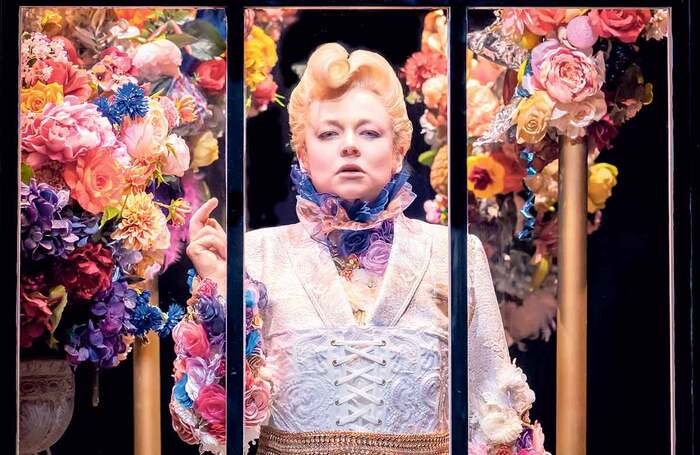
For the love of theatre
Then there’s theatre. In the grand total of all the things Cohen and Blavatnik invest in, theatre “is a decimal point”. But it’s an important decimal point, insists Cohen. “Len has a genuine and deep love of theatre. It’s an unpredictable business. It’s probably easier to lose money than make money. But the reason Access does it is his love for it. Len was pretty much the earliest outside investor in Hamilton, which he saw at a workshop. He’s got great instincts and great taste.”
But even when it comes to theatre – perhaps especially when it comes to theatre – investment cannot be philanthropy. “We run our theatrical business on the basis of making a profit, as we do in all our other creative sectors.”
When Cohen co-founded Access Entertainment in 2015, the move was unexpected. He had spent 15 years in publicly funded broadcasting, first at Channel 4 and E4, where he commissioned Skins and The Inbetweeners, then at the BBC. He became controller of BBC Three in 2007, and was partly responsible for popularising Family Guy in the UK, scheduling it at the same time every night on the youth-orientated channel.
In 2010, he was made controller of BBC One. Name some of the BBC’s biggest hits at the time, chances are Cohen commissioned them: Call the Midwife, Poldark, Happy Valley, to name but three. He became director of BBC Television in 2013, overseeing all the corporation’s channels as well as its film unit, BBC Films and its iPlayer output.
Although still only in his 30s, surely the next step would be director general? But in October 2015, Cohen made the surprise announcement that he was leaving the BBC. He didn’t have a job lined up, as many assumed; he was just itchy.
“I’d been there about seven or eight years, I’d been at Channel 4 about seven or eight years. I didn’t want to be there forever, and I was ready to do something different. And those places need creative re-energising every few years. I’m a believer that no one should do those jobs for too long.”
The world was changing. Appetites were changing. The commercial landscape was – and remains – in a massive state of flux.
“I could feel that coming. We had an interesting moment where we were massively outbid on The Crown by Netflix. There was a point in time, not too long before that, when the greatest prize would have been to have The Crown on BBC One. It just wasn’t any more, and that was interesting to me. I could feel that change happening.”
A few months later, after discussions with Blavatnik, whom he’d met through his wife, the economist and author Noreena Hertz, he launched Access Entertainment, the cultural and creative division of Blavatnik’s Access Group, which invests in everything from biotech to media and real estate.
From being in charge of hundreds of millions of pounds of licence fee payer money, he was now in charge of hundreds of millions of pounds of Len Blavatnik’s money.
‘We run our theatrical business on the basis of making a profit, as we do in all our other creative sectors’
“I try to be very respectful of his money, and I try to treat it with the care that I would if it was my money.”
It was a steep learning curve – and that was precisely the point. “I had some nice offers after I left the BBC, but I wanted to do something that made me nervous again, which would create a runway for another 25 or 30 years of working. Lots of new brain food, lots to think about. I didn’t want to go and do the same thing somewhere else.”
While Cohen’s role at the BBC covered just TV, now he’s in charge of a portfolio that includes film, theatre, digital, gaming, YouTube content creators and visual arts (Access is the principal investor in Lightroom, the immersive visual art experience in King’s Cross that hosted the David Hockney exhibition Bigger and Closer (not smaller and further away)).
Although he is handling private rather than public money, the ethos, he reckons, is still the same: “I’m looking for the sweet spot of high quality and audience appeal. I was never a believer at the BBC in making really good things that no one really wanted to watch. I thought that the best use of public money was to try to reach as many people as possible – as long as it’s high quality. So I start from a point at which the best chance of success is to try to do something very well and with high quality. That’s true of both environments.”
Mostly, that means star-led shows or big titles, in the West End and on Broadway. And now you can say the same thing about theatre as you could about the BBC: name the biggest hits, chances are Access has money in them. Hamilton, Cabaret, Moulin Rouge!, the list is long.
Sometimes Cohen is simply putting money behind these shows, sometimes he’s taking a much more active role as a producer. “We’ve been developing a musical about Pavarotti with John Berry, one of our companies has been developing a Great Gatsby musical with Florence Welch. We’re deeply involved in those things. Most of them, though, are: ‘We back you, here’s the money, here’s some hopefully useful editorial thoughts – but you go and do it.’”
It’s similar in cinema: Access invests in many of these films, but gets closely involved with some. “With The Zone of Interest and The Iron Claw, we’ve been involved for a long time. I provide script notes, notes on the edits, things like that. And I still read a lot of scripts, both theatre and movies, for things we might invest in.”
Really good scripts, Cohen says, stand out. “I found some of the things that I’ve been most congratulated on or have helped me in my career weren’t very difficult decisions, because the quality was so much higher.” That was true of Skins almost two decades ago, and it was true of The Zone of Interest. “When I read the first draft, it was just so extraordinary. There was not a single word that wasn’t freighted with meaning and purpose. I’ve never read a script that was so economical.”
Continues...
Making hay at the Haymarket
One important asset in Access’ portfolio is Theatre Royal Haymarket, which Blavatnik acquired in 2018 for a reported sum of £45 million. In February 2019, Only Fools and Horses the Musical opened and ran (with Covid breaks) until April 2023. But Cohen is clear that long runs are not what he wants at the theatre.
“That was an astonishingly long run, which was commercially successful for all of us. But now that has finished, we can implement the strategy we wanted to implement when Len bought the theatre, which is limited-run, star-driven plays. They don’t have to be revivals of existing shows. We’ve actually got a couple in the pipeline that are new plays. If it’s the right talent, and star-driven, we’re very open to new work. We want it to be the most sought-after premium playhouse in London.”
Tom Basden’s brilliant adaptation of Dario Fo’s Accidental Death of an Anarchist ran in 2023, followed by Noises Off with Felicity Kendal. Then came the hugely feted The Picture of Dorian Gray, featuring Succession’s Sarah Snook as well as a team of camera operators.
For Cohen, the show was “the absolute sweet spot” of talent, innovation and creativity, of quality and commerciality.
Cohen works with Theatre Royal Haymarket managing director Nigel Everett to find the right production at the right time. Sometimes they come with big-name actors attached – Access brought A View from the Bridge across from Theatre Royal Bath with Dominic West already in it – and sometimes they go out looking for a show with a star.
Blavatnik is relatively unusual in the world of theatre ownership in that he only owns one theatre. Is he interested in expanding that portfolio? “I think, in theory, he would be open to owning more. But there’s actually very few you can buy, and they don’t come up for sale very often. It’s a very consolidated industry.” How about theatres outside London?
“Being frank, no.”
The focus is very much on the West End and Broadway – and even Broadway is proving more difficult these days.
“The capitalisations have got so high and it’s very hard to see, even if they’re great productions, how you get to recoupment.”
‘The reality is: there are cheaper tickets, but often the press talks about the most expensive ones. You can buy a ticket for A View from the Bridge for £25’
Does that benefit the West End? “I think it will, to some extent. A play or musical in the West End costs three times as much to do on Broadway. Of course, ticket prices are higher there, and the rewards can be higher if it’s a success, but the risk/reward ratio on Broadway is becoming harder and harder to justify.”
When it comes to ticket prices, Cohen is keen to ensure there are cheaper ones in the mix for each production. “We always have good conversations with producers about them. The reality is that there are cheaper tickets, but often the press talks about the most expensive ones. You can buy a ticket for A View from the Bridge for £25. There aren’t many visitor experiences in Britain you can have now for much less than that. They’re less good seats, but that’s the way it’s always been with theatre. You also have to take into account that theatre is a high-risk investment for people who fund it and many productions lose money on cheaper tickets. They do need to make a profit.”
So how often does the theatre work make a profit? Cohen slightly dodges the question: “It’s no different to other areas of the creative arts. The big outsized hits help cover the cost of the ones that don’t work. Hamilton’s a good example. Moulin Rouge! is going very well for us. They help pay for the ones that don’t recoup.”
But there’s another driving factor in the shows that Access funds and produces. In 2020, Access backed Tom Stoppard’s play Leopoldstadt, which followed a Jewish family in Vienna through the first half of the 20th century. In 2021, there was Cabaret, set in a Weimar-era nightclub in Berlin during the birth of Nazism. In 2023, it produced Good by CP Taylor in which David Tennant played a ‘good’ man seduced by Nazi ideology. Up next at the Theatre Royal Haymarket is Farm Hall, based on the conversations of six German nuclear scientists – some Jewish – held in a stately home in the UK as the Second World War ends.
“That’s very deliberate. Holocaust education is very, very important to Len, to his wife Emily, and to me. We really try to support projects around Holocaust education. But they’ve got to hit the same bar of high quality.”
The results speak for themselves: two Oscars for The Zone of Interest, two Oliviers and four Tonys for Leopoldstadt, seven Oliviers for Cabaret. In fact, awards seem to be magnetically attracted to productions that have Access money behind them.
But Cohen repeats what every theatre producer has learned – many by losing their shirt – which is that there’s no formula for success. “Reading the script of Dorian Gray, you could never have imagined what Kip Williams and Sarah Snook and the whole team managed on it. Sometimes there’s a weird alchemy and it works. And sometimes it just doesn’t.”
A View from the Bridge runs until August 3 and Farm Hall from August 7-31 at London’s Theatre Royal Haymarket; for more information click here
Big Interviews
Recommended for you
Opinion
Most Read
Across The Stage this weekYour subscription helps ensure our journalism can continue
Invest in The Stage today with a subscription starting at just £7.99
